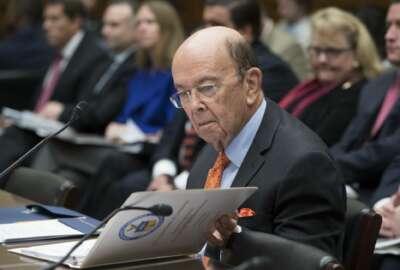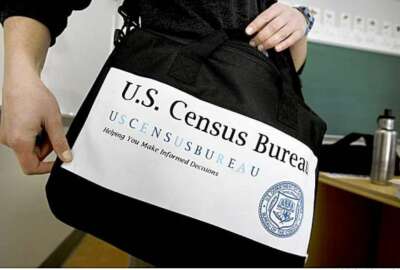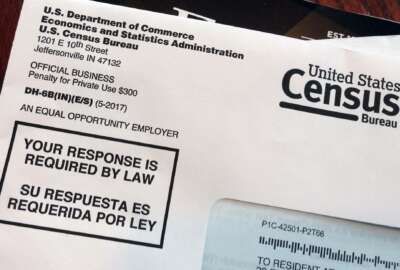
Census director nominee sees ‘confidence’ in cybersecurity preparations
Steven Dillingham, the Trump administration's pick to head up the Census Bureau, just 18 months out from the 2020 decennial count, faces the challenge of overseeing...
Best listening experience is on Chrome, Firefox or Safari. Subscribe to Federal Drive’s daily audio interviews on Apple Podcasts or PodcastOne.
Steven Dillingham, the Trump administration’s pick to head up the Census Bureau, just 18 months out from the 2020 decennial count, faces the challenge of overseeing the first census that households can respond to online.
As the Census Bureau works behind the scenes with a team of agencies to protect its huge trove of personal data, Sen. Claire McCaskill (D-Mo.), ranking member of the Homeland Security and Governmental Affairs Committee, told Dillingham that his leadership over the 2020 count would have a long-term impact.
“If we had a breach of census data, it would permanently affect the capability of this country to gather essential data in the future,” McCaskill said at a confirmation hearing Wednesday. “I think many Americans don’t realize how important that data is in terms of many decisions that directly impact their lives.”
Dillingham pointed McCaskill to the agency’s ongoing collaboration with the departments of Homeland Security and Defense, as well as the intelligence community and “some of the best talent, even from the private sector,” to conduct penetration testing and other cybersecurity measures.
“Generally, I will say that from the management reviews that have been conducted, the Census Bureau is reporting their progress and their confidence in many of the security protections being put into place,” Dillingham said.
In August, Census Chief Information Officer Kevin Smith explained that data submitted by users online and in the field by enumerators using iPhones would be encrypted and immediately transmitted to the agency’s data “vault.”
“All these things, I think, contribute to the safety of the data. Yet we still need to make sure that we have plans in place as well as the resources to accomplish that mission” Dillingham said.
The Government Accountability Office, also in August, identified 3,100 cyber vulnerabilities” that need to be addressed in the coming months.” The watchdog office has also highlighted the 2020 count on its list of high-risk federal programs.
“In a way, we’re sort of blessed. Agencies don’t like to have all their challenges necessarily identified and publicized at times, but it’s a great service,” Dillingham said. “It really relieves the agency of the introspection for doing that.”
However, McCaskill expressed concern with the timeline Census has laid out to tackle some of the cyber risks outlined by GAO.
“We’re told by the staff that it’s going to begin this coming spring. I’m trying to figure out why we’re waiting until next spring,” she said, urging Dillingham to make meetings with DoD’s Cyber Command and cyber officials at DHS at top priority if confirmed.
“We have the capability within DHS and DoD right now, if they are assigned the mission by this administration, to do all-hand-on immediately to make sure that steps have been taken to make the systems secure,” McCaskill added.
Before his nomination for the top Census job, Dillingham has held posts at two smaller government statistics offices — the Bureau of Justice Statistics and the Bureau of Transportation Statistics — under the Obama administration.
Under the Trump administration, Dillingham now works for the Peace Corps’ Office of Strategic Information, Research, and Planning.
Between October 2015 and December 2017, the agency’s cost estimate for IT grew from $3.41 billion to nearly $5 billion. Census and GAO cited the need for more technical integration services and updated costs for its mobile devices contract played a significant role in the rising cost of IT.
“IT acquisition is the black hole of government spending, no matter where it is,” McCaskill said. “IT acquisition has been a huge problem is government, typically because we can’t compete for the same talent. There’s been such a demand for talent in the IT sector — that government doesn’t pay what the private sector does, so as a result, we farm it all out. And if you don’t know enough to know what you’re buying, you defer to the people you’re buying it from.”
The Census Bureau also faces a greater challenge hiring enumerators to fill temporary jobs than it did in 2010, due largely to a lower unemployment rate.
“When you’re hiring, even on a temporary basis, hundreds of thousands of employees, it is a mammoth responsibility, Dillingham said. “I’m informed from public information that the plans are there, progress is being made, and it appears to be, at this time, on schedule.”
Last year, the agency considered, but ultimately scrapped plans to partner with the Postal Service and use letter carriers to serve as enumerators.
However, Sen. James Lankford (R-Okla.) asked Dillingham to consider partnering with the IRS.
“The cost of the census collection has continued to go up and up, and as we look for areas of efficiency, it only seems to make sense to try and partner, every 10 years, IRS form filling with also Census form filling,” Lankford said.
Dillingham said he would be open to “innovative thinking” on how the Census Bureau on how to conducts its on-the-ground operations, including a potential partnership with the Peace Corps.
“They have returned Peace Corps volunteers that may be looking for employment, and they may well be positioned,” he said. “I just point to those by way of example, but I do think it will be very important to identify groups that may be ready, willing and able to assist with the enumeration, and then figure out how quickly they can be brought on board.”
Copyright © 2025 Federal News Network. All rights reserved. This website is not intended for users located within the European Economic Area.
Jory Heckman is a reporter at Federal News Network covering U.S. Postal Service, IRS, big data and technology issues.
Follow @jheckmanWFED





